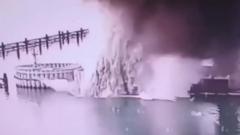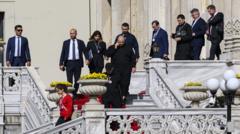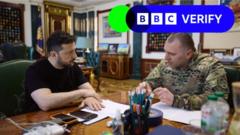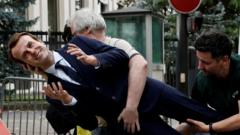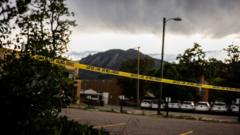General Carsten Breuer emphasizes the serious threat posed by Russia, highlighting its extensive military preparations aimed at Western allies.
**Nato Faces Potential Russian Threat in Coming Years, German Defence Chief Warns**
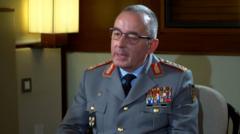
**Nato Faces Potential Russian Threat in Coming Years, German Defence Chief Warns**
Germany's defence chief warns of a looming Russian attack on Nato, urging readiness and military buildup.
In a significant statement at the Shangri-la Dialogue in Singapore, General Carsten Breuer, Germany's chief of defence, warned members of the North Atlantic Treaty Organization (Nato) to be vigilant against a potential attack from Russia within the next four years. Breuer explained that Russia is currently ramping up its military production, manufacturing hundreds of tanks annually, which could be deployed against Baltic states by 2029 or even sooner.
Emphasizing the severity of the situation, General Breuer noted this presents a threat of a magnitude he has not experienced in his four-decade career. "Russia's military buildup is on an enormous scale," he stated, revealing that the country is producing approximately 1,500 main battle tanks yearly, with a portion earmarked for stockpiling or for new military formations targeting the West.
Along with tank production, Breuer highlighted that Russia generated an extensive supply of artillery ammunition, estimating four million rounds of 152mm artillery shells to be produced in 2024, with not all intended for the ongoing conflict in Ukraine. Analysts from Germany and allied nations support this assessment, further underscoring the idea that Russia is actively preparing for a potential offensive against NATO territories.
"There's a clear intent and stockpiling for a future assault on the Baltic states," Breuer said, cautioning that readiness must be prioritized, particularly as he assessed the situation could escalate before 2029. He expressed urgency, stating the need for NATO to be prepared to respond immediately.
Fears surrounding a Russian attack on any NATO member are heightened due to the implications it could have for a broader conflict involving the United States, a pivotal NATO ally. Article 5 of the NATO agreement stipulates that an attack on one member necessitates a collective response from all.
Breuer specifically pointed out the Suwalki Gap, a critical corridor bordering Lithuania, Poland, and Russia, as particularly vulnerable to an attack. The perception of threat varies greatly among European nations, he mentioned, citing the intense feelings of the Estonians who likened their proximity to the conflict to living near a wildfire, highlighting a contrast with Germany’s relatively distant view of the conflict.
Noting recent provocative actions by Russia, including attacks on undersea cables and cyber operations against European infrastructure, Breuer called for NATO members to enhance their military capabilities. He stressed the need for unity and increased military spending to effectively defend against growing threats.
Despite concerns over cohesion within NATO, particularly with Hungary and Slovakia's warming relations with Russia, Breuer maintained that the alliance remains strong. He underscored the unprecedented unity following the Ukraine conflict, particularly with new members Finland and Sweden joining NATO.
General Breuer's comments reflect a pivotal shift in Germany's defence stance amid rising threats from Moscow, with increasing consensus across political lines regarding the necessity for a robust military response. Yet, lingering questions remain about the pace at which European military production can scale up to meet the demands of modern warfare, especially amid U.S. commitments pivoting away from Europe to focus on the Indo-Pacific region.







